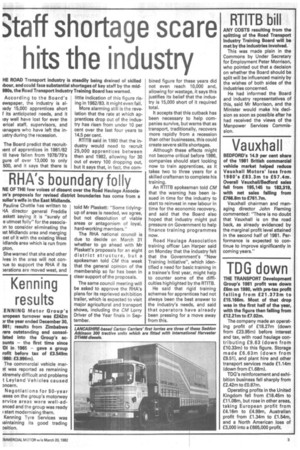3taff shortage scare hits the indust
Page 3

If you've noticed an error in this article please click here to report it so we can fix it.
HE ROAD Transport industry is steadily being drained of skilled ibour, and could face substantial shortages of key staff by the mid980s, the Road Transport Industry Training Board has warned.
According to the Board's ewspaper, the industry is allady 15,000 apprentices short I its anticipated needs, and it lay well have lost for ever the erical staff, supervisors, and ianagers who have left the inustry during the recession.
The Board predict that recruitlent of apprentices in 1981/82 ill have fallen from 1978/79's gure of over 13,000 to only 500, and it says that there is little indication of this figure rising in 1982/83. It might even fall.
More alarming still is the revelation that the rate at which apprentices drop out of the industry has risen from under 10 per cent over the last four years to 14.5 per cent.
RTITB said in 1980 that the industry would need to recruit 25,000 apprentices between then and 1982, allowing for 30 out of every 100 dropping out, but it says that, in fact, the corn bined figure for these years did not even reach 10,000 and, allowing for wastage, it says this justifies its belief that the industry is 15,000 short of it required total.
It accepts that this cutback has been necessary to help companies survive, but warns that as transport, traditionally, recovers more rapidly from a recession than other businesses, this could create severe skills shortages.
Although these effects might not become critical before 1986, companies should start looking now to train apprentices, as it takes two to three years for a skilled craftsman to complete his training.
An RTITB spokesman told CM that the warning has been issued in time for the industry to start to reinvest in new labour in time for the economic recovery, and said that the Board also hoped that industry might put pressure on Government to help finance training programmes now.
Road Haulage Association training officer Len Harper said on Monday that the industry felt that the Government's "New Training Initiative", which identified a need for basic training in a trainee's first year, might help to counter some of the difficulties highlighted by the RTITB.
He said that rigid training schemes for apprentices had not always been the best answer to the industry's needs, and said that operators have already been pressing for a move away from this.
















































